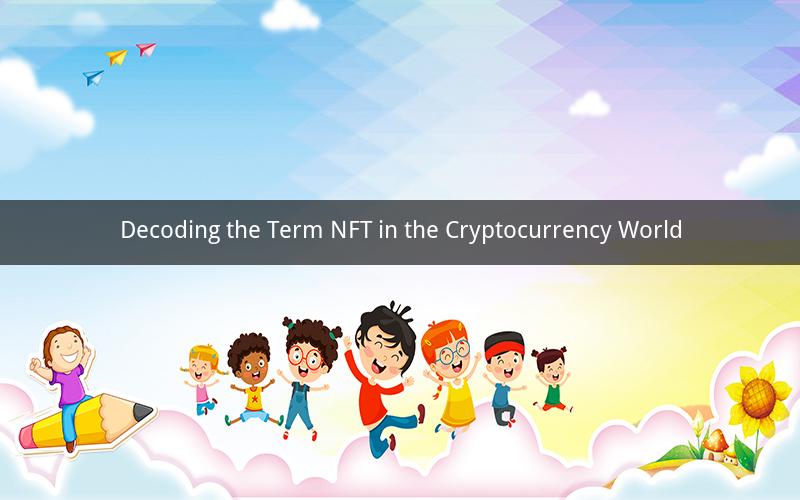
In the rapidly evolving landscape of digital assets, one term that has gained significant attention is "NFT." If you are new to the cryptocurrency space or simply curious about this intriguing concept, this article will delve into what NFT stands for in the context of crypto. Let's explore the origins, characteristics, and significance of NFTs in the world of cryptocurrencies.
What is NFT?
NFT stands for Non-Fungible Token, a digital asset that is unique and cannot be exchanged on a one-to-one basis with other tokens. Unlike cryptocurrencies like Bitcoin or Ethereum, which are fungible and can be exchanged in a 1:1 ratio, NFTs are one-of-a-kind and cannot be replicated or replaced by another token.
The concept of NFTs has been around for a while, but it gained widespread recognition in 2021 when digital artists, musicians, and celebrities started to mint and sell their creations as NFTs. Now, NFTs are not only limited to digital art but also encompass a wide range of other assets, including collectibles, virtual real estate, and even digital identities.
Characteristics of NFTs
1. Uniqueness: Each NFT is unique, and its value is derived from its rarity and the demand for that particular asset. No two NFTs are identical, making them highly valuable in the digital realm.
2. Ownership: NFTs provide a clear record of ownership, making it easier for individuals to prove that they own a specific digital asset. This aspect is crucial in the world of digital collectibles, where authenticity is a major concern.
3. Transferability: NFTs can be easily transferred from one owner to another. Once purchased, an NFT can be sold, traded, or gifted to another individual without any middleman involvement.
4. Interoperability: NFTs can be integrated into various blockchain platforms, allowing creators and owners to interact with their digital assets across different ecosystems.
5. Provenance: NFTs maintain a record of the asset's history, including previous owners and transactions. This feature ensures that the provenance of the digital asset is transparent and verifiable.
The Significance of NFTs in Cryptocurrency
1. Art and Entertainment: NFTs have revolutionized the art and entertainment industry by providing artists and creators with a new medium to monetize their work. Digital art, music, and videos can now be tokenized and sold as NFTs, enabling artists to receive fair compensation for their creations.
2. Collectibles: NFTs have become a popular platform for collecting digital collectibles, such as virtual trading cards, sneakers, and memorabilia. These collectibles can be bought, sold, and traded with ease, offering enthusiasts a new way to showcase their passion.
3. Virtual Real Estate: NFTs are also making waves in the virtual real estate market, allowing users to purchase, sell, and rent digital properties. This emerging sector has the potential to reshape the traditional real estate industry.
4. Digital Identities: NFTs can be used to represent digital identities, such as avatars, profile pictures, and badges. These digital identities can be used across various platforms, ensuring a seamless and secure user experience.
5. Blockchain Integration: NFTs are playing a crucial role in integrating blockchain technology into various industries, from real estate to gaming. By tokenizing assets, NFTs are bridging the gap between the digital and physical worlds.
Frequently Asked Questions about NFTs
1. What is the difference between an NFT and a cryptocurrency?
Answer: The main difference lies in their fungibility. Cryptocurrencies, like Bitcoin and Ethereum, are fungible and can be exchanged on a 1:1 basis. In contrast, NFTs are non-fungible and cannot be replaced by another token.
2. Can NFTs be used as a medium of exchange?
Answer: While NFTs can be exchanged for other tokens or cryptocurrencies, they are not typically used as a medium of exchange in the same way that fiat currencies or cryptocurrencies are. NFTs are more commonly used as digital assets and collectibles.
3. How are NFTs created?
Answer: NFTs are created by minting them on a blockchain platform, such as Ethereum. The process involves assigning a unique identifier to a digital asset, which is then stored on the blockchain and can be bought, sold, or traded.
4. Are NFTs secure?
Answer: Yes, NFTs are secure because they are stored on a decentralized blockchain. This ensures that the ownership and provenance of the digital asset are transparent and verifiable.
5. Can NFTs be stolen or lost?
Answer: NFTs can be stolen or lost, just like any other digital asset. However, their decentralized nature makes it more challenging for attackers to steal or lose them. It is essential for NFT owners to take appropriate security measures, such as using secure wallets and two-factor authentication.
In conclusion, NFTs have become an integral part of the cryptocurrency world, offering unique and innovative ways to create, own, and trade digital assets. As the technology continues to evolve, we can expect to see even more applications of NFTs across various industries.